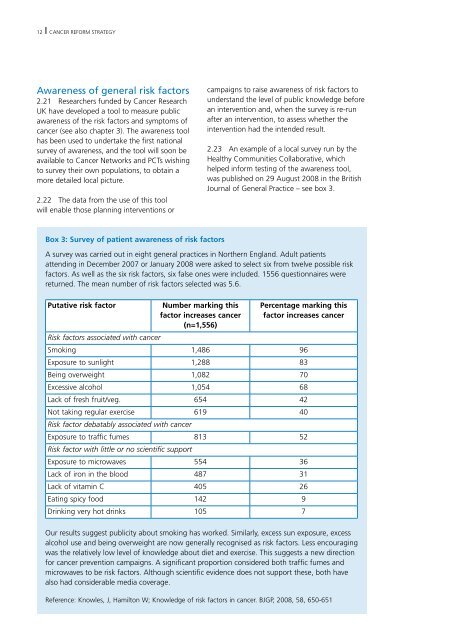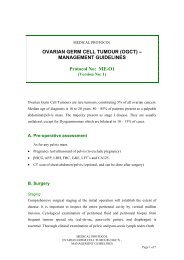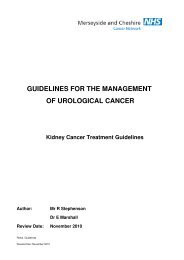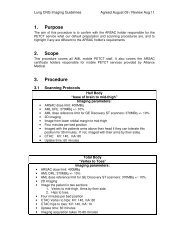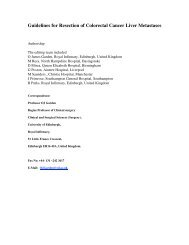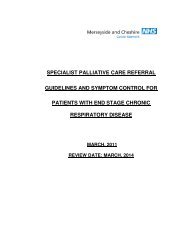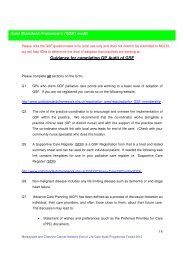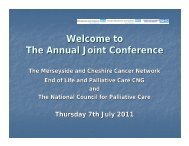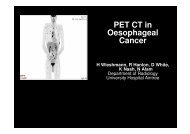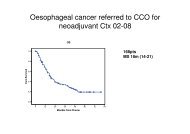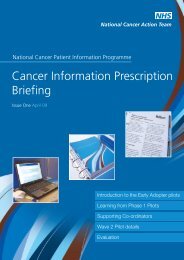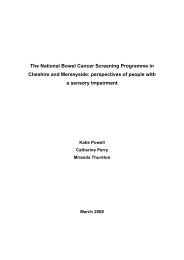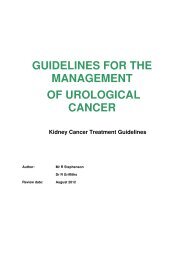Cancer Reform Strategy - First Annual Report - Merseyside ...
Cancer Reform Strategy - First Annual Report - Merseyside ...
Cancer Reform Strategy - First Annual Report - Merseyside ...
You also want an ePaper? Increase the reach of your titles
YUMPU automatically turns print PDFs into web optimized ePapers that Google loves.
12 CANCER REFoRM STRATEgyAwareness of general risk factors2.21 Researchers funded by <strong>Cancer</strong> ResearchUK have developed a tool to measure publicawareness of the risk factors and symptoms ofcancer (see also chapter 3). The awareness toolhas been used to undertake the first nationalsurvey of awareness, and the tool will soon beavailable to <strong>Cancer</strong> Networks and PCTs wishingto survey their own populations, to obtain amore detailed local picture.2.22 The data from the use of this toolwill enable those planning interventions orcampaigns to raise awareness of risk factors tounderstand the level of public knowledge beforean intervention and, when the survey is re-runafter an intervention, to assess whether theintervention had the intended result.2.23 An example of a local survey run by theHealthy Communities Collaborative, whichhelped inform testing of the awareness tool,was published on 29 August 2008 in the BritishJournal of general Practice – see box 3.Box 3: Survey of patient awareness of risk factorsA survey was carried out in eight general practices in Northern England. Adult patientsattending in December 2007 or January 2008 were asked to select six from twelve possible riskfactors. As well as the six risk factors, six false ones were included. 1556 questionnaires werereturned. The mean number of risk factors selected was 5.6.Putative risk factorNumber marking thisfactor increases cancer(n=1,556)Percentage marking thisfactor increases cancerRisk factors associated with cancerSmoking 1,486 96Exposure to sunlight 1,288 83Being overweight 1,082 70Excessive alcohol 1,054 68lack of fresh fruit/veg. 654 42Not taking regular exercise 619 40Risk factor debatably associated with cancerExposure to traffic fumes 813 52Risk factor with little or no scientific supportExposure to microwaves 554 36lack of iron in the blood 487 31lack of vitamin C 405 26Eating spicy food 142 9Drinking very hot drinks 105 7our results suggest publicity about smoking has worked. Similarly, excess sun exposure, excessalcohol use and being overweight are now generally recognised as risk factors. less encouragingwas the relatively low level of knowledge about diet and exercise. This suggests a new directionfor cancer prevention campaigns. A significant proportion considered both traffic fumes andmicrowaves to be risk factors. Although scientific evidence does not support these, both havealso had considerable media coverage.Reference: Knowles, J, Hamilton W; Knowledge of risk factors in cancer. BJgP, 2008, 58, 650-651


